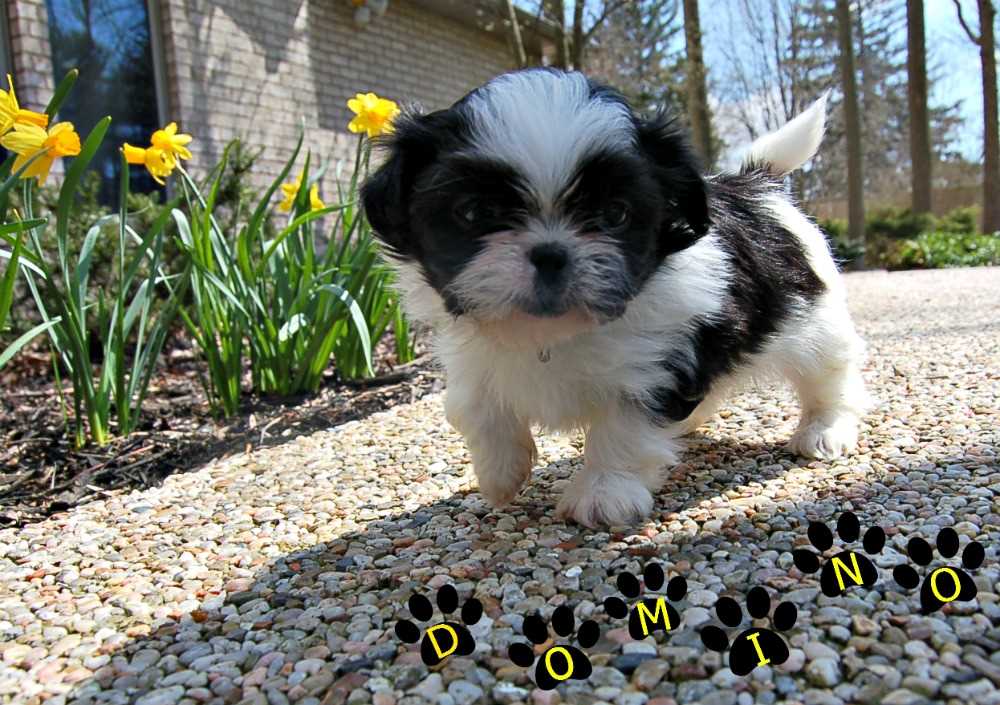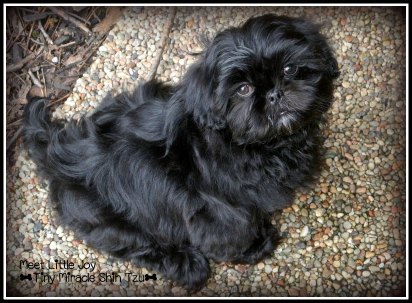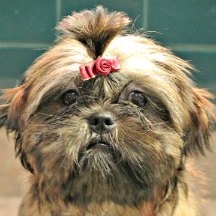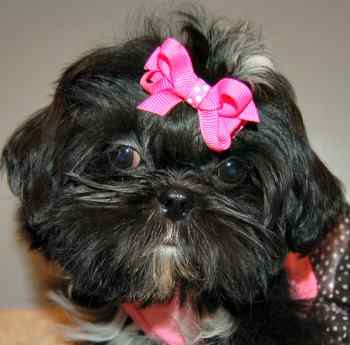- Home
- Puppy Development
- Puppy Development
Puppy Development:
Your Puppy from 6 to 12 weeks
by Janice Jones |Last updated 08-06-2021
Puppy Development goes to full throttle at six weeks of age.
Now your puppy is emerging into a lively, playful puppy full of energy and personality. This is the period of curiosity and exploration. Many people ask me what the puppy's personality is like and I tell them to wait until the puppy is six weeks of age.
This is the second part in a series on Puppy Growth.
Click here if you missed part one: Newborn to Six Weeks of Age
Or, if you prefer, jump to the Shih Tzu Adolescence Stage.
Want the bare facts? Check out the Development Milestones Page.

The Six Week Old
Play takes on new dimensions and toys become fascinating objects. Puppies want to explore and will find ways explore every inch and cranny of their allotted space. During this period, breeders should continue to offer stimulation in the form of sounds, smells, and textures and provide interesting environments for puppies to explore.
During the period between five and seven weeks of age, puppies are high on curiosity and low on fear. This can be a fun time for puppies, but more diligence is needed keeping them safe. This is also a good time to add more enrichment activities to the daily routine -- slightly scary people, items and experiences.
We may do silly things like wear a hat or carry an umbrella --
unpredictable events in the puppy's eye but not life threatening.
Puppy's exposed to slightly fearful events bounce back quickly and are
less prone to phobias later on.
If the puppies have not been
introduced to the great outdoors, they take make their first adventure
around this time.
Shih Tzu puppies love snow and cool weather, but very young puppies cannot tolerate the cold for very long.
At Six Weeks of Age, Puppies Need:
- Wormings
- Possibly first shots
- Plenty of time to play with Mama dog
- Weaning to 3 meals/day of high quality puppy food
- Socialization with lots of different people
- Opportunities to explore different places, surfaces, toys, objects
- Opportunities to hear lots of household noises
- Opportunities to use all of their senses: hearing, seeing, smelling, touching, tasting
Mama continues to teach her puppy manners especially “bite suppression. " Puppies learn what appropriate canine behavior is and is not through the use of play and observing other canine body language. These behaviors will be repeated for two weeks until they become fully weaned and ready to go to their forever home.
Smaller breeds such as Yorkshire terriers, teacup toy poodles and Chihuahuas may need more time with mama and the litter mates. A puppy of 6 weeks is curious, friendly, outgoing and fully ready to learn. If socialized correctly he will be completely ready and eager to please his new human family when that time comes.
At six weeks of age, puppies may be ready for their first shots and they should have already had a couple of wormings by now.
The tiny breeds may not get their first shots until around the age of 8 weeks. If the puppies are small, I try to hold off vaccines until 8 weeks.
Puppy Development: Eight Weeks Old
At eight weeks of age, many small breed puppies are ready to go to their new home. Others will stay with their canine mother and breeder for another 4 weeks. This is especially true of the smallest of the toy breeds.
At eight weeks the puppy begins to experience caution in his action. At previous stages of puppy development, he was exuberant and reckless, charging forward without any fear. During the next couple of weeks, the puppy becomes cautious and checks everything out.
At Eight Weeks of Age: Puppies Need
- First vaccinations
- Wormings
- Possible placement in new home
- Exposure to plenty positive experiences and people
- Continuing socialization
- Begin potty training
- Reduction of any experiences that may be fear provoking
It is important that new owners let nature take its course as the puppy will get through this stage and move on relatively quickly. It is also important that owners not “cuddle and baby” the puppy during this stage, but rather assure for the puppy’s safety, but not jump in to rescue them unnecessarily. Some puppies develop fear and anxiety issues if allowed to be rescued during this time that are hard to correct later on.
If the puppy goes to his new home during this time, the first few nights will be tough for the little guy as he has not had too much experience being on his own. Socialization is very important during this stage of puppy development and will continue to approximately 12 weeks of age.
Before a puppy arrives, your house should be ready including puppy proofed for the puppy's safety. The more new sights, sounds, smell etc. that he can experience the better. Puppies that have lots of socialization experiences and stimulus during this period will be much better equipped to handle change as they grow. This is also a great time to begin training.
The first training is potty training and then simple commands. Basic obedience is best started at home and then enrollment in a formal obedience class once he is fully immunized is always a good idea. Immunizations are vital to the health of young puppies and should take priority over any attempts at socialization.
For example your young puppy is not ready for a dog park until all of is immunizations have been given. The best rule of thumb that I have been able to determine is to treat a pup as if it were a newborn human infant. Anything you wouldn’t do to an infant, you shouldn’t do to a puppy.
Puppy Development: 12 Weeks
This is considered to be the puppies “tween” stage because the first signs of independence is noticeable. We call this the pre-teen stage in human development. This is a very demanding stage of puppy development and the well-behaved little guy who stuck right by your side will suddenly want to ignore you and do his own thing. Behavior is a little erratic during this period and tends to fluctuate from being a sweet cuddly baby to a stubborn tween.
At 12 Weeks of Age: Puppies Need
- Puppies go to their new homes
- Visit to Veterinarian
- Continue with 3 meals/day
- Vaccines needed
- Socialization
- Training: House training Crate training, and basic commands
- Started on Heartworm preventative
- Plenty opportunities for play and exercise
Teething begins in earnest and the puppy tries to find anything and everything to chew upon, whether it is a favorite wooden chair or a person’s toes. This is the time when potty training usually occurs and beginning obedience training such as how to walk on a leash, not necessarily how to heel. By the end of this period, the puppy should have received his third set of puppy shots and a Rabies vaccination.
It is during this stage that the growth spurt that your little puppy has experienced since birth will begin to slow down. You may also notice a decrease in the amount of food that the small puppy consumes. One the puppy is fully vaccinated; it is a good time for you and your puppy to explore the world. He should go with you on outings whenever possible. This is also a good time to begin puppy kindergarten and teach your puppy some basic commands.
References:
Another Piece of the Puzzle: Puppy Development by Pat Hastings and Erin Ann Rouse, Editors (2008)
Puppy Problems? No Problem! by Brenda Aloff (2011)
"Hi, I'm Janice Jones, a former veterinary technician and Shih Tzu expert with over 40 years of experience with the breed. Through Miracle Shih Tzu, I combine my medical background and extensive breed knowledge to provide reliable, practical advice for Shih Tzu owners. My mission is to help you give your Shih Tzu the happiest, healthiest life possible through evidence-based information and real-world solutions. Whether you're new to the breed or a seasoned owner, you'll find trusted guidance here for all aspects of Shih Tzu care.
I hold an undergraduate degree in Psychology with a minor in biology, Early Childhood Education, and Nursing, and a Master's in Mental Health Counseling.






